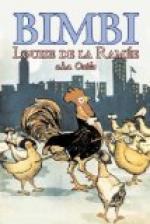“One does not like to be vulgarized,” said the Lady of Meissen, angrily.
“My maker, the Krabbetje,[Footnote: Jan Asselyn. called Krabbetje, the Little Crab, born 1610, master-potter of Delft and Haarlem] did not trouble his head about that,” said the Haarlem jar, proudly. “The Krabbetje made me for the kitchen, the bright, clean, snow-white Dutch kitchen, well-nigh three centuries ago, and now I am thought worthy the palace; yet I wish I were at home; yes, I wish I could see the good Dutch vrouw, and the shining canals, and the great green meadows dotted with the kine.”
“Ah! if we could all go back to our makers!” sighed the Gubbio plate, thinking of Giorgio Andreoli and the glad and gracious days of the Renaissance: and somehow the words touched the frolicsome souls of the dancing jars, the spinning teapots, the chairs that were playing cards; and the violin stopped its merry music with a sob, and the spinnet sighed, thinking of dead hands.
Even the little Saxe poodle howled for a master forever lost; and only the swords went on quarreling, and made such a clattering noise that the Japanese bonze rode at them on his monster and knocked them both right over, and they lay straight and still, looking foolish, and the little Nymphenburg maid, though she was crying, smiled and almost laughed.
Then from where the great stove stood there came a solemn voice.
All eyes turned upon Hirschvogel, and the heart of its little human comrade gave a great jump of joy.
“My friends,” said that clear voice from the turret of Nurnberg faience, “I have listened to all you have said. There is too much talking among the Mortalities whom one of themselves has called the Windbags. Let not us be like them. I hear among men so much vain speech, so much precious breath and precious time wasted in empty boasts, foolish anger, useless reiteration, blatant argument, ignoble mouthings, that I have learned to deem speech a curse, laid on man to weaken and envenom all his under-takings. For over two hundred years I have never spoken myself: you, I hear, are not so reticent. I only speak now because one of you said a beautiful thing that touched me. If we all might but go back to our makers! Ah, yes! if we might! We were made in days when even men were true creatures, and so we, the work of their hands, were true too. We, the begotten of ancient days, derive all the value in us from the fact that our makers wrought at us with zeal, with piety, with integrity, with faith,—not to win fortunes or to glut a market, but to do nobly an honest thing and create for the honor of the Arts and God. I see amidst you a little human thing who loves me, and in his own ignorant childish way loves Art. Now, I want him forever to remember this night and these words; to remember that we are what we are, and precious in the eyes of the world, because centuries ago those who were of single mind and of pure hand so created us, scorning sham and haste




